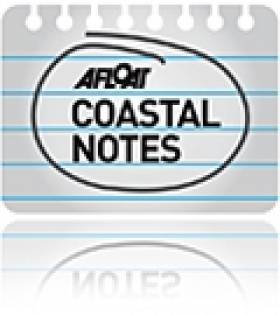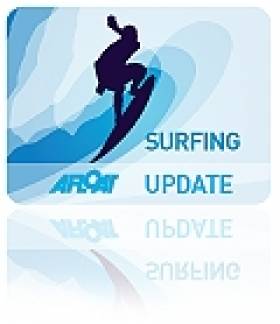Displaying items by tag: Gaeilge
A new TV series as Gaeilge follows presenters Tessa Fleming and Irial Ó Ceallaigh as they embark on an epic adventure paddling their way along the North Coast.
Together with kayaking expert John Hubbocks, the novice kayakers brave the unpredictable Atlantic wind and waves, pushing themselves beyond their comfort zones to complete their challenge.
This four-part series Kayak-Ó-Thuaidh, made by Macha Media for BBC Gaeilge and RTÉ with support from Northern Ireland Screen’s Irish Language Broadcast Fund, showcases the stunning scenery of the northern Atlantic coastline, its rich history and the people who call it home.
Tessa and Irial face many challenges along the way and draw on their inner strength and physical stamina to navigate storms, tides and physical injuries, as they paddle from northwest Donegal to the northeast coast of Co Antrim.
In the first episode, on BBC iPlayer and BBC Two Northern Ireland on Monday 11 March at 10pm, the presenters undergo difficult training sessions in Co Down before starting their journey at Bunbeg harbour in Co Donegal. Their first challenge takes them to Gola Island and then to the Bloody Foreland in Gaoth Dobhair.
Episode two continues with a challenging paddle that takes them from Magheraroarty Beach to Tory Island and on to Sheephaven Bay, concluding at the iconic lighthouse on the edge of the Fanad peninsula.
Our adventurers tackle the Inishowen peninsula in episode three, setting off from Fort Dunree they make their way to Inishtrahull, Ireland’s most northerly island, and continue eastwards towards Lough Foyle and Magilligan.
In the final episode, Tessa and Irial embark on the last leg of their journey from Magilligan to Ballycastle, with one last push taking them to the spectacular wildlife haven of Rathlin Island.
Kayak Ó Thuaidh starts on Monday 11 March at 10pm on BBC iPlayer and BBC Two Northern Ireland. All four episodes will be available to watch for viewers in Northern Ireland on BBC iPlayer from this date.
Coastal, Seabed Maps & Guides Go Irish
#CoastalNotes - Irish school pupils will benefit from the publication of new maps and guides to the country's onshore and offshore geology in the Irish language.
Derek Evans writes in The Irish Times on the recent launch of An Geolaíocht ó bhun go barr at Letterkenny's Coláiste Ailigh, in conjunction with translated editions of the Bedrock Geological Map of Ireland and the Real Map of Ireland - the latter of which is an important resource for studying the seabed around the Irish coast.
Published by the Sherkin Island Marine Station, An Geolaíocht ó bhun go barr is an accessible study guide to the basic geological and geographical processes relevant to Ireland, and is particularly useful for post-primary schools both within Gaeltacht areas and nationwide.
But it also has value to adults who can learn about the natural history of Ireland and improve their Irish at the same time.
The launch is part of commitments made under the Department of Gaeltacht Affairs’ Irish Language Scheme to translate and publish a wide range of literature from the Geological Survey of Ireland.
Learn To Surf - Through Irish!
#Surfing - Fancy learning to surf as Gaeilge? One surf school in the sunny southeast is giving international visitors the opportunity to do just that.
The Freedom Surf School in Tramore, Co Waterford offers 'Ireland's only accredited surfing certificate course through the Irish language'.
And in time for The Gathering initiative, this summer the school is running a series of surf camps for developing oral skills through actively learning the language.
These five-day camps involve classroom tuition in the mornings, while the afternoons will be spent surfing trí Ghaeilge - all led by qualified Irish teachers and surf instructors.
For more details visit the Freedom Surf School website HERE.































































